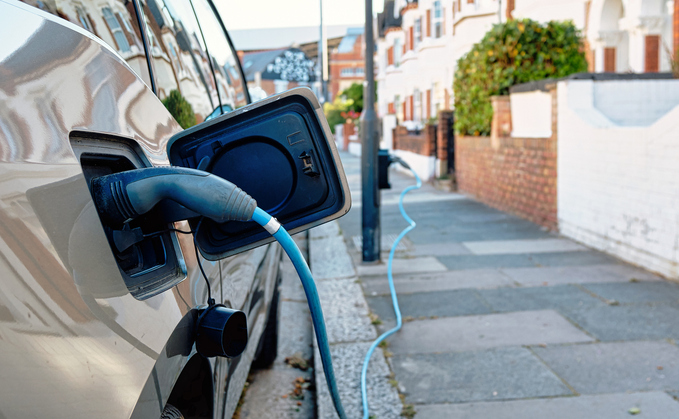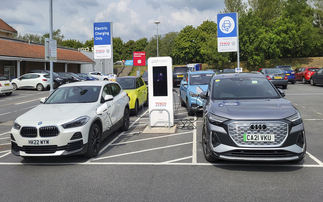Credit: iStock
Auto industry body urges next government to deliver targeted policies to accelerate uptake of electric vehicles
Car industry body SMMT is calling on the next government to offer more generous tax breaks, incentives, and subsidies to drive adoption of electric vehicles (EV) in the UK, claiming the right policy conditions could fuel £50bn-worth of green growth over the next decade.
Research published today by SMMT claims targeted policies from the next government to lower the cost of clean power, support green skills development, and boost EV incentives for consumers could put millions more electric cars and vans on UK roads over the next decade, while boosting the sector's global competitiveness in the face of growing competition from China and the EU.
Such efforts could help 17 million drivers of fossil fuel cars switch to zero emission vehicles by 2035, which would halve the number of petrol and diesel cars on UK roads, and drive down cumulative CO2 emissions from drivers by 175 million tonnes, the research estimates.
Moreover, it could provide a major boost to UK manufacturing, with more than one million new electric cars and vans rolling off production lines each year, helping to deliver some £800bn of revenue over the next decade, the trade body added.
SMMT said halving VAT on new retail EV purchases for the next three years would help the sector to deliver an additional 300,000 new electric car registrations on top of current projections, meaning up to 2.3 million new EVs could be driving on Britain's roads in three years' time.
At the same time, it is calling for further steps to boost the UK's global competitiveness in light vehicle production - such as lowering the cost of energy, reducing trade barriers, and cutting red tape - which it claimed could help the sector rollout more than nine million EVs between now and 2035, delivering more than £290bn in revenue at factory gate prices.
SMMT said targeted EV policies from the next government could grow the value of the UK's new car market from just over £70bn a year today to almost £80bn annually over the next decade.
"The UK automotive sector has proved its resilience during recessions and pandemics," said SMMT's chief executive Mike Hawes. "Now, it's ready to grow. With voters preparing to cast their ballots next week, the next government will have the power to unlock the sector's potential, boosting the economy, creating jobs and cutting carbon.
"The industry's vision is of green growth and a fair transition for all. Whoever forms the next government, we urge them to create the conditions that will allow us to deliver on our promise."
The Conservatives and Labour were considering requests for comment on SMMT's research at the time of going to press, although both have signalled their intention to support the UK car industry in the face of intensifying competition from Chinese EV manufacturers should they win next week's General Election.
The Conservative manifesto pledges to provide £4.5bn to "strategic manufacturing" sectors, including carmakers, in addition to accelerating the nationwide rollout of charging points to encourage wider uptake of zero emission vehicles.
Labour, meanwhile, has promised in its manifesto to accelerate the EV chargepoint rollout across the UK, in addition to restoring the 2030 phase out date for new fossil fuel vehicles, which was controversially pushed back to 2035 by the Conservative government last year. It has also promised to provide financial support for new battery gigafactories through its planned National Wealth Fund.
However, the auto industry has repeatedly warned additional policies are likely to be needed to drive demand for EVs if the sector is to meet the target of phasing out the sale of new petrol and diesel cars by 2030.
The EV market has grown rapidly in recent years, with EVs now routinely accounting for around 17 per cent of the new car market. But sales growth has slowed slightly in the past year and manufacturers have warned they need to see a significant uptick in demand to meet the target set through the government's Zero Emission Vehicle (ZEV) Mandate for 22 per cent of sales to be EVs this year. As such the industry has argued the government should emulate other European markets and re-instate grants or tax breaks to help drive demand.
However, SMMT's calls for further tax and policy support received a mixed response from environmental groups and policy experts.
Matt Finch, UK policy manager at Transport & Environment, said the UK needed a clearer industrial strategy to drive the investment needed to grow the domestic EV sector, but disputed whether it was necessary to offer the car industry "huge tax breaks".
"Electric vehicles are the future, and the last government put in place good policies that has given the automotive sector the certainty it needs to invest in EV production," he said. "The SMMT is right to call for a much stronger industrial strategy, particularly around sourcing critical raw materials, but wrong to ask for huge tax breaks. More than anything the next government needs to tackle the rising tide of EV misinformation coming from certain parts of the media."
You can now sign up to attend the fifth annual Net Zero Festival, which will be hosted by BusinessGreen on October 22-23 at the Business Design Centre in London.










